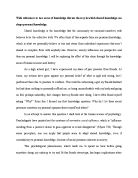With references to two areas of knowledge discuss the way in which shared knowledge can shape personal knowledge.
With references to two areas of knowledge discuss the way in which shared knowledge can shape personal knowledge.
Shared knowledge is the knowledge that the community we surround ourselves with believes to be the collective truth. We often think of this separate from our personal knowledge, which is what we personally believe is true and stems from individual experiences that aren’t shared in complete form with anybody else. However, society influences our perspective and thus our personal knowledge. I will be exploring the effect of this claim through the knowledge areas of human sciences and history.
As a high school girl, I have experienced my share of peer pressure from friends. At times, my actions have gone against my personal belief of what is right and wrong, but I performed them due to pressure to conform. This could be ostracizing a girl my friends disliked but had done nothing to personally offend me, or being uncomfortable with my body and going on fad, perhaps unhealthy, diet changes that my friends were doing. I have often found myself asking “Why?” From this I formed my first knowledge question: Why do I let these social pressures constrain my personal opinions about myself and others?
In an attempt to answer this question I shall look at the human science of psychology. Psychologists have pointed out the existence of normative social influence, which is “influence resulting from a person’s desire to gain approval or avoid disapproval” (Myers 733). Through sense perception, one can imply that people seem to adapt shared knowledge, even if contradictory to personal knowledge, because of social pressures inherent in society.
This psychological phenomenon, which leads me to spend an hour before going anywhere doing my makeup to try and fit this female stereotype, has larger implications when brought into more serious matters. This leads me to my second knowledge question: What are the consequences of society’s shared knowledge influencing our personal knowledge?
Figure 1.
I shall explore this question through the human science of sociology. It has been suggested that the influence of shared knowledge into our personal knowledge is due to an inherent ecological framework in society (Figure 1) (Heise 283). Within male society, there is the cultural ideology of hypermasculinity, “a system of ideas forming a worldview that chauvinistically exalts male dominance by assuming masculinity, virility and physicality to be the ideal essence of a real man.” (Mosher 64). Figure 1 illustrates how shared knowledge, the macrosystem, influences the internal layers till it trickles down into personal history, which forms our personal knowledge which, in the case of Figure 1, hypermasculinity seems to be a cause of gender based violence. Numerous institutions of religion, wives submitting to their husbands in the Bible and Skandapurana, and governments, many feminist groups arguing that anti-abortion laws are ways for governments to place women in the scope of property rather than as individuals (Hendricks), instill a sense of hypermasculinity to see women as property and the power of men over women. Through the way of knowing of reason, an implication is produced that normative social influence and the notion of conformity suggest how social and cultural constructs, this shared knowledge, shape our personal views and the perception of social acceptability, consequently affecting our actions.
However, the claim that we see shared knowledge shaping personal knowledge in our actions assumes that our actions are completely affected by our perception of their social acceptability. Therefore, my counter-claim is that actions can be done without a person being influenced by the apparent social acceptability of their actions and therefore their actions are based solely on their personal knowledge of how to react. Crimes of passion go against the social belief that killing people is wrong. However, these actions are done in the heat of the moment, moved by passion and in the law there is the case for temporary insanity. Such as in the case of Daniel Sickles who did not deny killing his wife’s lover but claimed he had done it as a product of uncontrollable rage and had been acquitted by the jury (Covey 1642). This leeway would suggest that since our laws accept that at times our actions may go against our better judgement, where reason derived from shared knowledge on the social acceptability of our actions goes blind, our laws then accept that moments exist wherein personal knowledge of how to react is developed separately from any form of shared knowledge.








